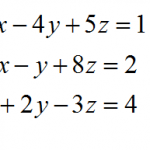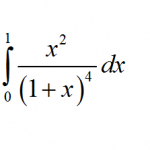
This article describes effective strategies for learning higher mathematics concepts that will be useful to those who are learning math on their own.
How much time do I need to study mathematics?
Generally, this is quite a fuzzy question, it depends on several factors: how often you study, how deeply you want to study mathematics (for example, only the school course or higher mathematics).
I can tell you that to repeat the entire high school course, takes roughly six months. Quite a long time, isn't it? No one said it would be fast.
Where do I learn math?
If you are not a big fan of using textbooks, you can largely do without them. However, you will still have to read them occasionally. It is not unreasonable to look at popular math courses online, because there, as a rule, they explain more clearly, and also it is very often free. For practice, you can also find problems on the Internet, or buy any textbook/task book will also do.
Top 8 Tips
1.Although many people have a fear of mathematics, research shows that a student's perception of intelligence as an object to be developed leads to a good dynamic of learning. That is, you need to believe in your abilities first. It has been proven that the brain develops even when you make mistakes. Don't worry if someone has an easier time solving a problem. More often than not, it's just a matter of experience and mental discipline.
2. Don't be afraid if you don't understand something, it's okay. If you don't understand something, reread/re-listen to the material several times, and/or refer to another resource.
3. Solve difficult problems and practice a lot. This is the only way you can best understand the topic. To learn math, you need to solve problems. And, of course, it is better if they are problems that are not boring to solve. If the task takes a long time to solve, leave it, and start again later. Come back to it until you've solved it, but don't spend too much time on it at once. At some point, your brain will learn enough from other tasks to solve the more difficult ones.
If you feel like you're stumped, don't hesitate to ask for help from those who are still learning math or are already experts. Seeing the situation with different eyes, you will discover unfamiliar sources of approaches to the solution.
4. Study every day, for at least an hour. Studying math should become a habit, like brushing your teeth.
5. Don't forget to rest, but remember that everything has limits.
6. Do not cram the material, but try to understand it. It is important to understand mathematics, i.e. to be able to derive formulas and apply them, prove theorems, and so on. It will be very useful to constantly ask questions in the style of "why exactly so?" and answer them. Move on to the next topic only when you are sure that you accurately understood the previous one and worked it out in practice.
7. Find yourself a mentor. This is not always easy, but if you can, it will be very cool. A mentor will always encourage or help with finance homework.
8. Don't be afraid to change resources for learning math, it is very important to find one that is right for you. So, you can learn math on your own, the main thing is to have a great desire. These were the thoughts I wanted to share. I wish you the best of luck in learning math. Don't give up and you will succeed.
In case you have any suggestion, or if you would like to report a broken solver/calculator, please do not hesitate to contact us .








